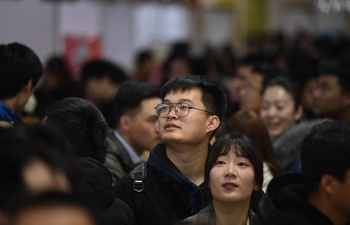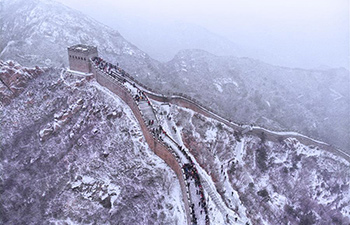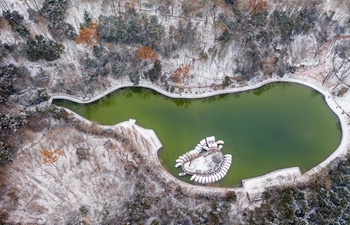
Participants pose for the group photo at the National Stadium during the Warsaw conference on the Middle East in Warsaw, Poland, on Feb. 14, 2019. Poland hosted a two-day international conference sponsored by the United States over peace and security in the Middle East region. (Xinhua/Jaap Arriens)
WARSAW, Feb. 14 (Xinhua) -- The international conference on the Middle East ended here on Thursday. During the two-day discussion, the United States and the EU have held different views on Iran issue, and didn't reach any agreements specifically.
The conference, which started on Wednesday, was co-organized by Poland and the U.S. The main topics included the political situation and the role of Iran in regional development, the situation in Yemen and Syria, the security and stability in the Middle East.
U.S. Secretary of State Mike Pompeo blamed the unstable situation in the region on Iran's "destabilizing influence". He said earlier on Thursday that peace and stability in the Middle East cannot be achieved "without confronting Iran".
In his closing remarks at the end of the conference, Pompeo said that "more sanctions and pressure on Iran is needed". He also urged other countries "oppose giving money to (Iranian President) Hassan Rouhani".
But the EU has different positions on Iran issue. "The European Union believes that maintaining the peaceful character of the Iranian nuclear program, calls for keeping the Joint Comprehensive Plan of Action, JCPOA, in place. The United States abandoned this agreement and imposed sanctions," said Polish Foreign Minister Jacek Czaputowicz.
"The nuclear deal with Iran plays a positive role in the long term," Czaputowicz said at the end of the conference.
Last year, the U.S. withdrew from a 2015 nuclear deal with Iran and reimposed sanctions. Other countries of the deal, including major European powers such as Germany, France and Britain, have since tried to keep the deal alive.
The conference on the Middle East was attended by the representatives of more than 60 countries. The U.S. invited Israel and Arab states, but not Iran.
EU foreign policy chief Federica Mogherini didn't attend the conference, and neither did foreign ministers of France and Germany, which sent lower ranking staff instead.
Iran's President Hassan Rouhani said Wednesday that Iran will stand firm in the face of U.S. sanction pressures.
Washington is targeting the Iranian nation with an "economic, propaganda and psychological war," Rouhani was quoted as saying by Press TV.
However, the Iranians will defend their dignity and independence, and will not "surrender to the enemy," he said.
Iran's Foreign Minister Mohammad Javad Zarif said on Wednesday that the anti-Iran meeting in the Polish capital Warsaw is "doomed to fail," semi-official ISNA news agency reported.
"This is another attempt by the United States to pursue its policies vis-a-vis Iran, which has not been forged properly," Zarif was quoted as saying.















